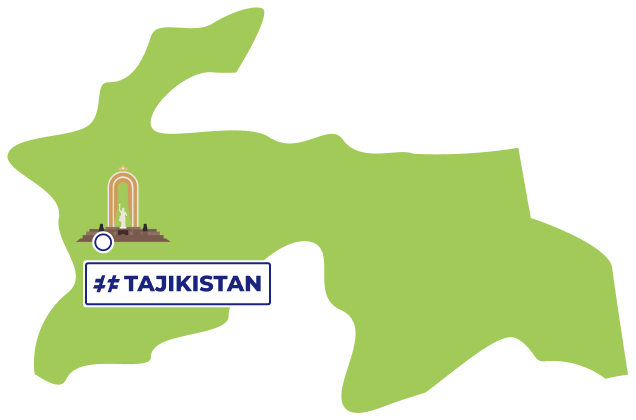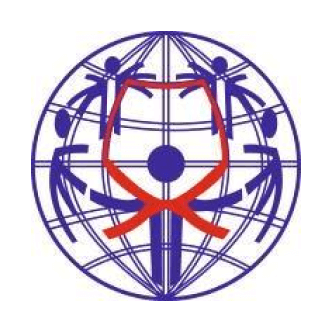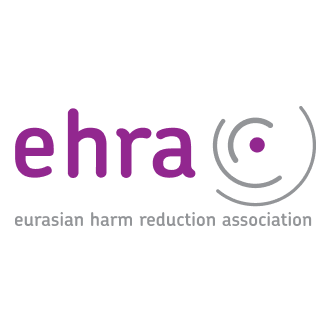
Tajikistan
01. HIV care cascade
ACTIVITIES
Improve HIV care cascade for key populations specific and targeted interventions in Dushanbe, Kulyab and Khorog of Tajikistan
Progress to date
Starting July 2022, Fast Track Cities initiative is being implemented in Dushanbe, Kulyab and Khorog. As the result of budget advocacy the city administrations in Dushanbe allocated $130 000 for HIV programs in 2022.
In Tajikistan – the Municipalities of Kulyab and Khorog established local working groups that developed local HIV plans that were approved in January 2024 in Kulyab and in May 2024 in Khorog. Key successes in 3 cities of Tajikistan: increased testing for HIV among KPs, initiated allocation of funds from city budgets for testing migrants in Dushanbe and Kulyab, improved cascade monitoring system to track the results of treatment from the moment of testing to a decrease in the viral load.
Assessment of OAT sustainability
Progress to date
Assessment of the sustainability of the opioid agonist therapy programme in the context of transition from donor support to domestic funding was conducted in Moldova and Tajikistan. The reports are being finalized and sent for design, they’ll be published by the end of Q1 2023. The assessments in Albania, Kyrgyzstan and Ukraine are ongoing and will be finalized in 2023.
Reassessing the sustainability of the opioid agonist therapy programme within the context of transition from donor support to domestic funding took place in 2022 in Tajikistan and Moldova, reports were published in 2023.
In 2023, the reassessment of the sustainability of the opioid agonist therapy programme within the context of transition from donor support to domestic funding also was finished in Ukraine, the report can be found at the link.
Provision of HIV prevention services with precautions against COVID-19
Progress to date
Work on shelters has expanded – in addition to 5 shelters for working with women who use drugs in conditions of violence (Ukraine, Serbia, North Macedonia, Kazakhstan), support for flexible shelters for representatives of the LGBT community in Kazakhstan, Uzbekistan, Kyrgyzstan and Tajikistan has been added. The program was distinguished by a special programmatic approach to working with clients – about 3,200 clients received material assistance in the form of food packages (Georgia, Kazakhstan). PPE support in Kaz for migrants and KGP (124,000 disposable masks, 1,000 antiseptics); CLM to provide quality services for clients of OST programs in 7 countries.
Procurement and distribution of Ag-RDTs
Progress to date
Purchased 120 thousand rapid antigen tests for COVID (Bosnia and Herzegovina, Serbia, Tajikistan, Ukraine) and 4,000 PCR tests for Ukraine to test key population groups and their close contacts.
REAct monitoring system implementation to capture COVID-19 related rights violations
Progress to date
Support of the hotline / phone services within REAct monitoring system implementation in order to provide distant support and legal consultations to women from groups at risk suffering domestic violence and experiencing human rights violations (in Tajikistan and Uzbekistan) – Distant legal consulting to avoid face-to-face meetings between client and REActors. With the help of crisis and instant assistance, it was possible to expand the coverage of clients with services (38% of all services in Tajikistan and 45% in Uzbekistan) and reduce barriers to accessing REAct services.
National Contingency Planning
Progress to date
Supporting key group populations in a COVID setting “General contingency planning guide developed in the frames of the C19RM is available here.
Guide by APH for Contingency Planning for Key Population HIV Services during COVID-19 and Other Emergencies for North Macedonia, Serbia, Bosnia and Herzegovina, Montenegro, Moldova, Georgia, Kazakhstan, Uzbekistan, Tajikistan and Kyrgyzstan in English is available at the link https://aph.org.ua/en/eeca/ in the folders with the names of each country.
02. Removing HR/gender barriers
ACTIVITIES
REAct (https://react-aph.org/): Monitoring of human rights violations and discrimination against PLHIV and KPs. Responding to such cases through provision or referring to legal or social services to victims and through advocacy actions. In Georgia, Kyrgyzstan, Moldova and Tajikistan, REAct system was initiated within SoS_project#1.0 in 2020, and in 2022 is transferred to national funding, meanwhile APH continues to provide technical support to users. In Ukraine, REAct was implemented in 2019 and is functional within national GF grant. REAct system is supported by APH in Uzbekistan for 2022-2023, in 5 Balkan countries – for 2022-2024, and in Armenia and Azerbaijan – for 2023-2024. At the same time, regional networks ECOM and ENPUD started to use REAct program for documentation in several countries of the region and are supported for 2022-2024 within SoS_project#2.0 grant.
Progress to date
Cumulatively, during 2022 there were registered 6700+ cases in 13 countries (Albania, Armenia, Bosnia and Herzegovina, Georgia, North Macedonia, Moldova, Montenegro, Kazakhstan, Kyrgyzstan, Tajikistan, Serbia, Ukraine, Uzbekistan) involving 170+ CBOs, as well as regional networks such as ECOM (in Uzbekistan, Tajikistan, Armenia, Kazakhstan, Kyrgyzstan) and ENPUD (Georgia, Moldova, Ukraine, Kyrgyzstan, Kazakhstan, Tajikistan, Belarus).
The following publications are available:
- Statistic country reports by APH on human rights violations based on REAct data collected in 2021 in Kyrgyzstan, in Georgia, in Moldova, in Tajikistan.
- Protectors or Perpetrators: the impact of unlawful policing on human rights and HIV. Join analytical publication in partnership with Frontline AIDS, Alliance for Public Health (Ukraine, Kyrgyzstan, Tajikistan, Moldova, Georgia, Uzbekistan), AIDS Foundation (South Africa), Gender Dynamix.
- Report on the results of the analysis of the Hotline calls by APH: Domestic and other forms of violence against women living with HIV and women in key populations during the COVID-19 pandemic in Tajikistan.
- REAct Statistical Report for the 1st half of 2022 by APH. Violations of the rights of people living with HIV and representatives of vulnerable groups in Georgia.
Situational Report by APH: Drug policy in Georgia and Challenges. - Series of publications by APH based on REAct data within regional campaign “16 days against gender-based violence”.
REAct system is available and functional at the national level in the following counties. It enables documentation of cases of human rights violations: Albania (45 cases), Armenia (182), Azerbaijan (174), B&H (70), Montenegro (60), Kazakhstan (363), North Macedonia (42), Tajikistan (1155), Serbia (24), Uzbekistan (835). More detailed data of 2023 is available in REAct Regional Digest and REAct website.
Cumulatively in 10 countries, 49,9% of documented cases were responded by REActors, their organizations or through referral to partner NGOs or institutions. During 2023 in 10 countries, there were provided 2162 consultations about human rights, 1022 consultations with professional lawyers. In 168 cases REActors helped to draft simple legal documents, such as complains or statement to police, in 236 cases represented client’s interests in medical facilities, assisted in getting medical services and support, in 336 cases – accompanied the client in the initial appeal to the police. There were at least 20 strategic court cases, and at least 162 cases were used for shadow reports to UN Treaty Bodies.
Cumulatively in 8 countries (Armenia, Azerbaijan, Kazakhstan, Albania, Bosnia and Herzegovina, Montenegro, North Macedonia, Serbia) 56,2% of documented cases were responded by REActors, their organizations or through referral to partner NGOs or institutions (https://drive.google.com/drive/folders/1wtJaecXERatg8cmrAE1mzaoshtdLQY_w). Numerous success stories of cases resolutions are available at REAct website.
Legal environment and situation analysis as well as mapping of civil society partners in the area of access by migrants to HIV and TB services
Progress to date
“On December 9, the REGMH with the assistance of the NCC Secretariat held in Dushanbe a Roundtable “Protection of health of migrants from Tajikistan”. The event was timed to presentation of a new study conducted by the REGMH: “Situation and Economic analysis of HIV-related health services in the field of migration in Tajikistan”.
On December 13, 2022, the Regional Expert Group on Migration and Health together with Central Asian Association of People Living with HIV held a Roundtable in Almaty “Health of HIV positive migrants in Kazakhstan”. The aim of the Round Table was to promote effective and timely treatment of international migrants living with HIV. During the meeting, the Situational and Economic analysis on the provision of HIV-related health services for international migrants in Kazakhstan was presented and discussed.
On December 19, REG together with local NGO “Real World. Real People” held a Roundtable in Armenia, Yerevan aimed to buster a discussion and exchange of experience on the provision of services for international HIV-positive migrants between heads of health authorities of the Republic of Armenia, government departments responsible for migration and civil society organizations. At the meeting, a study “Analysis of legal and institutional barriers to accessing HIV services among migrants in the Republic of Armenia” (developed by REG in 2021) was presented.
Also, in Q4 REG has launched a study is Kyrgyzstan.
On October 11, REG held an online meeting “Migrants’ access to HIV services in Central Asia and Caucasus” that gathered representatives of UNAIDS, Central Asian Association of PLHIV (Kazakhstan), TB People (Georgia), NGO “Real World, Real People” (Armenia), IFRC Central Asia, WHO Europe, Elton John AIDS Foundation, NGO Equality Movement (Georgia), AFEW (Kyrgyzstan), IFRC South Caucasus, Global Fund, WHO, and MSF. The goal of the meeting was to initiate a discussion and work out possible solutions to provide access to HIV services for those who urgently left the countries following the political situation.”
03. Budget advocacy
ACTIVITIES
Legal framework for financing HIV services from domestic funds – development and approval
Progress to date
Targeted activities were held in all project countries to discuss with national and international, governmental and non-governmental stakeholders the changes needed to enable sustainable and uninterrupted funding of HIV-related activities from national resources. Through targeted advocacy, technical support, and an integrated approach to HIV funding, in 2022 the project team managed to allocate approximately 1,7 million USD at the national level to programs for key populations, using social contracting mechanisms: Moldova – 154,126.84 USD; Kazakhstan – 118,529.33 USD; Kyrgyzstan – 61,000 USD; Tajikistan – 19,200.00 USD; Georgia – 357,000 USD; Ukraine – 931,453.96 USD.
Over three years of implementation of SoS_project 2.0 has contributed to significant changes in the financing of HIV services in 14 countries in SEE and EECA regions. The project supported the development of service delivery standards, pricing methodologies, and quality control procedures, which are critical for sustainable financing from the state budget.
The practice of social contracting is applied without interruption in 14 countries.
Increasing domestic financing of countries for services to key groups
Progress to date
Targeted activities were held in all project countries to discuss with national and international, governmental and non-governmental stakeholders the changes needed to enable sustainable and uninterrupted funding of HIV-related activities from national resources. Through targeted advocacy, technical support, and an integrated approach to HIV funding, in 2022 the project team managed to allocate approximately 1,7 million USD at the national level to programs for key populations, using social contracting mechanisms: Moldova – 154,126.84 USD; Kazakhstan – 118,529.33 USD; Kyrgyzstan – 61,000 USD; Tajikistan – 19,200.00 USD; Georgia – 357,000 USD; Ukraine – 931,453.96 USD.
Thanks to budget advocacy within the SoS project 2.0, the amount of money allocated from national budgets for HIV services through social contracting mechanisms in EECA project countries amounted to $3 269 959 in 2024. During SoS project 2.0 – $ 6 273 049 were allocated for social contracting in EECA region. The cumulative domestic budget expenditures for servicing key populations in 5 countries of SEE amounted to $1 061 383 in 2024. During SoS project 2.0 – $ 3 236 260 were allocated for social contracting in SEE region.
Regulation of service packages for key groups
Progress to date
In the reporting period, the Emergency package of services for key and vulnerable groups of the population in the field of HIV, and TB in the context of military conflicts was finalized, including tariffication. On its basis, in 2023, the process of advocacy and promotion of implementation at the level of countries in the EECA region will be launched.
Strategic Brief on Business Continuity (link) and Strategic Brief on Social contracting (link) were developed. In addition, Analysis of Quality of Services Provided in Azerbaijan was held and is available at the link.
Over three years of implementation of SoS_project 2.0 has contributed to significant changes in the financing of HIV services in 14 countries in SEE and EECA regions. The project supported the development of service delivery standards, pricing methodologies, and quality control procedures, which are critical for sustainable financing from the state budget.
The practice of social contracting is applied without interruption in 14 countries.
Municipal budget advocacy for cities that chose the Fast Track approach: in Dushanbe, Kulyab and Khorog cities of Tajikistan
Progress to date
As the result of budget advocacy the city administrations in Dushanbe ($130 000), Podgorica ($43 000), Skopje ($35 000), Tirana (USD 32,000), Novi Sad (USD 9,000), Sabac ($7 500) and Zvezdara ($4 000) allocated funds for the implementation of activities that would achieve the goals of the Paris Declaration.
In Tajikistan, the cities allocated municipal funds for HIV programs or KPs during 2022-2024: Dushanbe -$331k, for the first time Kulyab allocated – $11k and Khorog -$2k.
The cumulative domestic budget expenditures for servicing key populations in 5 countries of SEE amounted to $1 061 383 in 2024. During SoS project 2.0 – $3 236 260 were allocated for social contracting in SEE region.
National info system with database, service provider app, and client app
Progress to date
ToR is developed, specifications are being developed, team is being trained, development is due to start in April 2023.
The APH National HIV prevention care and support information system was finalised for and piloted in Kyrgyzstan in close collaboration with the UNDP and the AIDS Centre. The pilot focused on two NGOs, sub recipients of the national Global Fund grant. The pilot utilised desktop and mobile data entry options; allowed to test out the newly developed batch/journal entry application and mode.
The System version was developed for Tajikistan and launched country-wide in collaboration with the AIDS Centre and the UNDP as the prime Global Fund grant recipient in the country. Up to 60 NGOs and trust cabinets (AIDS Centre service points) have started using the system, entering data for several quarters of the year, based on existing sources, as well as ongoing program implementation. The teams are using both desktop and mobile data entry options and are being supported by the APH team as they become more familiar with the system and/or identify additional changes or improvements required.




